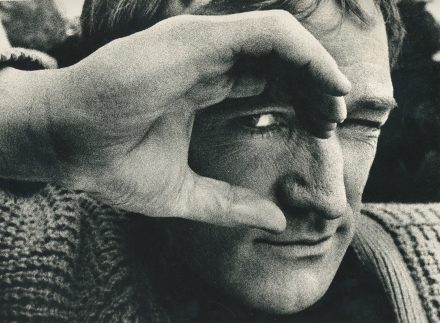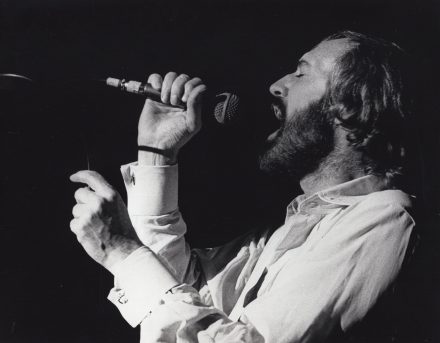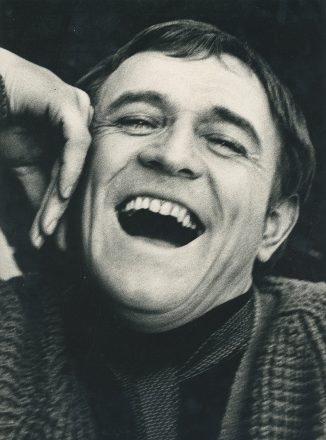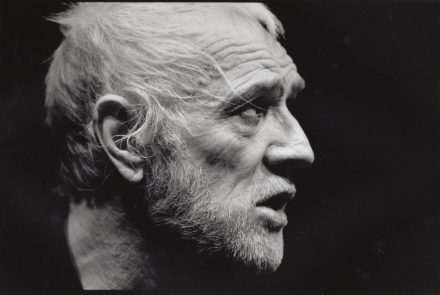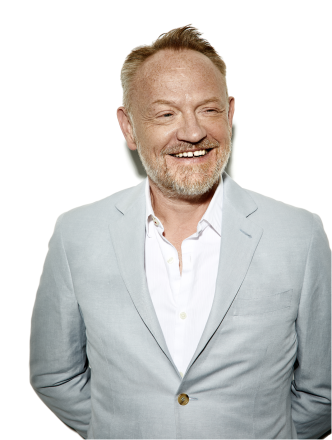
Richard Harris left behind a legendary legacy as one of Ireland’s most talented actors, and one of his era’s most buzz worthy public figures. He was a thinker, a tough guy, a poet, a father, and a lover, and the documentary The Ghost of Richard Harris explores all those facets.
The film is streaming now on BritBox and director Adrian Sibley uses the perspective of Richard’s three sons to put perspective on the award-winning actor’s life.
The three brothers–actor Jared Harris, actor Jamies Harris, and director Damian Harris–reflect on their relationships with their father, his passion and purpose, and what drove him.
I spoke to Jared about the documentary, and he reflected on growing up as the son of one of the world’s most fascinating actors.
Andrew Powell: This film is so personal, and I’m curious for you, and your family, how you felt about the approach of the film, and the fact that it reveals so much about your father’s life?
Jared Harris: We had co-operated with the filmmaker, Adrian Sibley… he was friends with my younger brother [Jamie], with me, and my older brother [Damian]… and dad had agreed to make a film with Adrian–a documentary–and then he passed away before they could get it off the ground. So we felt that he had been chosen by dad, so there was some comfort in that.
And what Adrian had done, is that he had gone through these recordings and taken out the pieces of it that he was interested in having us react to, so that we could talk.
What we agreed was that we would be completely candid and tell the truth, from our point of view, and that Adrian would be respectful. You know, he wasn’t going to turn it into some sort of awful tabloid junk, and that was largely what our interest was, not turning it around.
But there’s a much bigger picture of a person there than just as the hell raiser, the wild person who lived this crazy life, and there was much more to him than that.
So I feel happy about the way it turned out, because you do get a really good sense of his spirit and his personality, but you don’t feel as though you got all of it, which is what would have pleased him. And there’s a lot out there on the internet that you can go and dive into and find out more.
It balances a wonderful line between who he was on the surface, in the public, and who he was obviously in private. I especially love the final moments, wrapping up about the angle he went for on the red carpet for Harry Potter. I thought that was so charming.
[For context, on the first Harry Potter film’s red carpet, Richard took his granddaughter, Ella Harris, with him, and they said that he had to take the role of Dumbledore or she’d never speak to him again. A lot of news stories came out of those interviews, but in the documentary, Ella revealed it wasn’t true.
“I’m afraid I didn’t say that I would never speak to him again if he didn’t do the Harry Potter films,” she said in the film. “Because he said the other option was to go to New Zealand for three years and do The Lord of the Rings, and he said, ‘I’ll have to miss the millennium, and I’ll be away in New Zealand three years,’ and I said ‘that’s terrible, definitely don’t do that.'”]
Jared: Yeah, he was an incredibly smart person and he was very strategic. He could have a plan like that one a year in advance and stick to it, and drawn as he did in that case, he came up with a story that he knew the press would be attracted to.
And when the moment came, like a good angler, he landed the fish.
That comes back to another thing, and his whole relationship with Jim Sheridan for The Field. I thought that conversation and how Jim Sheridan shared what your father actually brought out in him, which is a remarkable thing for a director to walk away from a film, and it seemed to change him.
Jared: Yeah, he was a… dichotomy of things. He was very challenging and he liked that challenge and he liked to work with people who were going to challenge him. And at the same time, there was a great sense of camaraderie. They could have these very fraught exchanges on set and then go to the pub at the end of the evening and have a laugh and drink, and it was something that he didn’t carry with him. He was very sure of his own mind.
So that battle over that scene, the moment when [Sheridan] says that was the worst overacting he’d ever seen, and then it was war after that, in my mind, I went, well of course it was. What did you expect? You’re not going to be able to say that to him and then not go, ‘okay, you’ve declared this is a battle of wills now, a contest, and that’s the arena.’ You’re going to be in on set every day, but really good work came from it, and [they were] good friends with each other.
They were very fond of one another. They remained friends afterwards.
I think you had to be prepared to be challenged if you’re going to work with him; you had to know your stuff. You had to know why you were making the choices you were making.
At the end of all this, did anything about the film affect your perspective on your father or did it support a lot of things that you thought before?
Jared: Well, I was most interested in hearing my brother’s opinions because, of course, a lot of that stuff was completely new to me. And the individual experiences I’ve had, I was often surprised when I speak to people about that.
I remember once, I went into a gift shop, a first edition gift shop in London looking for first night gifts for a play. A friend was opening in a play and the woman said, ‘Oh, your father used to come in here all the time and buy first night gifts for people. Yeah, he used to drop to one knee and sing opera to me,’ and I had never, ever, ever heard him do that.
So it’s just constant little surprises, and that, again, that was part of it. He was different things to different people. He took on different roles to different people, depending on what he felt they needed.
I love the way that you mentioned that the documentary, and it provided such a great lens to view his entire story through.
Jared: [He was] like a good manager of a sports team or something… that was part of the that was part of the conceit, it’s not a documentary in the sense that we’re not going to take you by the hand and lead you through a life or lead you through a career and say he was born in this house on Thursday, and then on the weekend he went off to London and started acting…
It was about an investigation of a person, of a personality, and who he, in his own words. He often said that the greatest role he ever played was Richard Harris, and that he enjoyed playing that part.
And then there’s that sort of interesting thing my mother put her finger on, which was that my father to this day is still called Dickie Harris in Ireland.
They don’t call him Richard; it’s Dickie Harris. And then no one outside of Ireland calls him anything except for Richard Harris, and they’re these two people, and Dickie Harris never left Ireland, and Richard Harris never went back.
It’s fantastic. It’s a beautiful story because it shares so much depth about who he really was that you don’t often see in stories like this.
Jared: I agree. I’m happy about it. I think he’d be happy about it because he would hate that [other] kind of plodding documentary. He would have hated that, and something that’s trying to unravel his mystery whilst also allowing the mystery to be maintained. Again, that was something that he would love.
Adrian said to me, when he agreed to make the documentary, [Richard said] ‘Okay, I’ll do it, but only if you agree that I’m going to lie half the time and I’m not interested in you trying to catch me out, what part I’m lying about and what part I’m telling the truth.’
The other side that the film quickly addresses was the conversation about how public relates to your father versus how you related to him. And I’m curious if part of the process, of making the film, was cathartic?
Jared: Well, that’s something that I mentioned, which is, if you’re a famous person, there’s a feeling that the public has ownership over that person, that they have a personal relationship with that person, and that’s why they they feel so entitled if they see them in a restaurant.
So then you you’re almost in a weird competition with the general public over ownership of your famous parents, [or] your partner or spouse or something, and your time with that person–which is always difficult to get because they’re busy and their careers take them all over the place.
And then the second part is, yes, it was wanting to show people who are interested, who thought that they had an idea of who he was, but there was a much, much, much bigger story and a bigger personality and a bigger life there than the sort of tabloid headlines of, you know, the hellraiser who gets into punch ups, and he would do that stuff on purpose.
I remember him telling me a story where Man In The Wilderness had come out and the box office numbers had dropped and Sandy Howard, the producer, said ‘Hey, it’s time for you to get into a fight again,’ and off he’d go, get into a punch up and be on the front pages. And they said, ‘his film is currently showing’ and the numbers would go up.
And it’s genius, really.
Yeah, it was, and even now that story overshadows the way that he was thought of, as being the real deal as an actor or as a creative force, and as an artist. So it was a trade off that, in the end, I think it’s hard to say that he regretted because he wouldn’t say that he regretted anything.
But I think the cost of that started to get quite heavy. You know, the price. Who’s paying for that? Because it wasn’t the same for some reason, not really the same for like Burton and O’Toole and certainly Finney, who avoided all of that, that reputation, if you like, even though he was a wild boy himself, you know, But I think partly it’s to do with he never apologized for it.
Whereas if you look at O’Toole, I mean, O’Toole had to stop drinking, and he looked back on that life as, I paid a price for it.
It was great fun when he went for that 12 year period where he didn’t drink, he said my life was boring. And he would say that on talk shows, so he didn’t say what you’re supposed to say, which is, ‘I had this wild life. I live this incredible life, did all these things that everybody wants to do, but it caught up with me in the end. And now I realize that maybe it wasn’t so great.’
He never said that, so he didn’t apologize. I think that’s probably the reason why people go, ‘well, we’re not going to let you have both.’
How would you say that your father affected your acting career?
Jared: I mean, obviously he did because your parents are role models. Both my parents were actors. My mother had a good eye for a good one, a great one liner or, you know, a carefully chosen moment of high drama in terms of actual practical stuff. I learned a lot from sitting at a dinner table with him once he knew I was interested in being an actor because up to that point they thought I was going to be a lawyer.
I was the middle child, so you’re always stuck in the middle of conflicts as a middle kid. So they thought I’d argue. Maybe you’ll be a lawyer or something like that, or be in academia, academics, academy somehow. And then once I went to Duke University, I got interested in theatre, and he wouldn’t come down and see me.
And my mom said, ‘You should. He’s really good.’ And he’d go, ‘Well, you’re his mother, of course you’re going to say that,’ but eventually he came down and saw me after I graduated and I had made a movie at Duke and I was in a play and he come down, saw the movie in the afternoon, the play in the evening, and he was going to say, be a director.
But 5 minutes into the play, I remember really clearly hearing him laugh, and once we went after the show, went out for dinner, he was so excited, so thrilled, and he was like, ‘Fuck, man, you got it. I didn’t know, I didn’t realize before I saw it, but yeah, you fucking got it.’ And he was excited because there was a whole world that he could now share with me.
So what did I learn? He would talk in detail about great performances that he’d seen on stage, and describe Olivier’s Coriolanus… and interpretations of Hamlet and stuff, and he’d say, why this one was different, what they were going for, things that stood out in his mind.
So I learned a lot from that, and then he would discuss Shakespeare plays that he wanted to do… and he would describe how he would imagine these things. He would probably end up directing these as well, if he was going to do them. So I learned a lot from him that way.
Jared Harris photo by Storm Santos. All other photos courtesy of BritBox.
Join our list
Subscribe to our mailing list and get weekly updates on our latest contests, interviews, and reviews.

